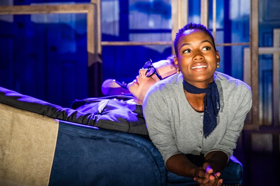Review: Almond Joy: Constellation Theatre Company's MELANCHOLY PLAY: A CONTEMPORARY FARCE

Sarah Ruhl is one of the most produced contemporary playwrights today, with provocative works like "Dead Man's Cell Phone" and "In the Room: The Vibrator Play." Less often produced is one of her earliest plays, the 2002 "Melancholy Play: A Contemporary Farce," especially since she reworked it in recent years as a chamber musical.
The version by the Constellation Theatre Company at Source that kicks off a season of productions under the theme "Epic Love," is based on the original. It is clear, however, that music has always been part of the play - from the cello playing throughout (by Kate Rears Burgman, to work composed by Wytold) to the simultaneous orations that bring to mind operatic duets,
Mostly, the play revolves around Tilly, whose melancholy (and not mere sadness and certainly not depression) enchants all around her. And even if it causes some unusual reactions among those in her orbit, it seems all perfectly natural to her.
This may be because of Billie Kirshawn's delightful performance. She alone understands all about the nuances of her character and her many quirks and delivers her personality just right, from dramatic turns of head at the start to wide eyed surprise and wider eyed joy at the end - a joy that puts off all those attracted to her initially for the melancholy.
Reactions to her vary widely, as do the performances. Frank (John Austin), who begins the show by stating the pluses of melancholy is like an innocent hero in a melodrama in his oversized glasses and purple vest.
A psychiatrist (Christian Montgomery) almost ruins the mood with over the top accent of "an unspecified European country" and farcical swoons.
Mary Myers is just right as a hairdresser who becomes smitten, as is Lillian Oben as her British companion (though her nurse's costume and cape seems pre-War).
Directed by Nick Martin, their cavorting on a functional set by Jonathan Dahm Robertson, backed with wooden window frames and cloud-painted doorways, takes a surreal turn when a character turns, Kafka-like, to into an almond.
This has something to do with one of Tilly's early inquiries that read like a non sequitur: "Why are you like an almond?"
But more than straight nuttiness, Ruhl has cited as a play influence a doctor who studied the amygdala, a part of the brain that processes memory, decision-making and emotional responses. It's also derived from the Greek word for almond.
Still, the good will that is built in the first half of the play seems to dwindle as the surrealism kicks in so late, pushing an extension in the narrative that approaches tedium.
Still, it's good when Burgman is finally invited to come forward to join the group after playing cello all night, if only to allow for proper coupling at show's end.
But here's something funny about the chamber musical version - which became briefly famous in New York when Ruhl successfully talked the papers into not reviewing it in 2012: Its music is by someone named Todd Almond.
Running time: About 95 minutes, with no intermission.
Photo credit: John Austin and Billie Krishawn in "Melancholy Play." Photo by DJ Corey Photography.
"Melancholy Play: A Contemporary Farce" by the Constellation Theatre Company continues through Sept. 2 at Source, 1835 14th St NW. Tickets are available at 202-204-7741 or online.
Reader Reviews

Videos
